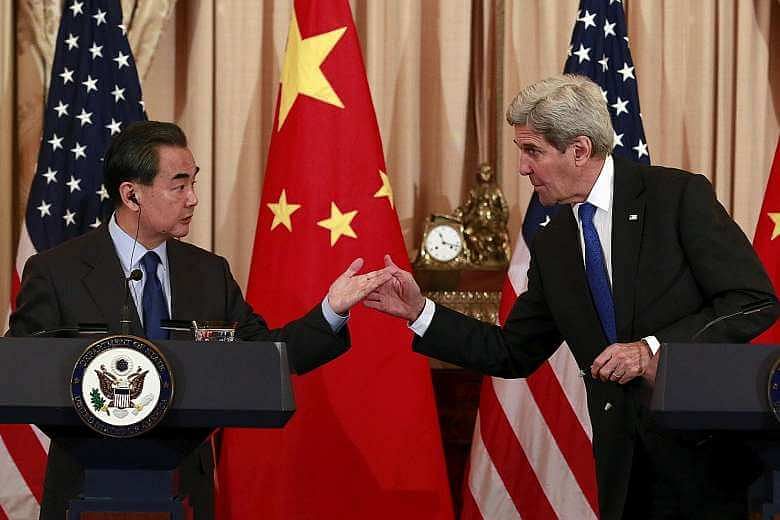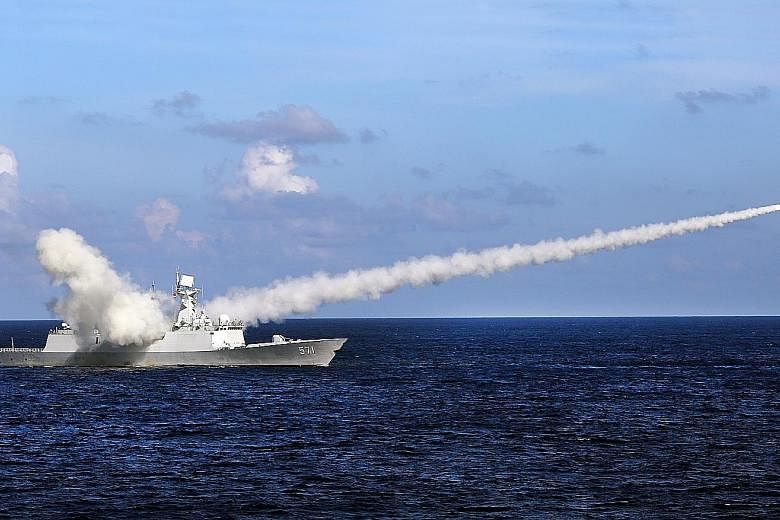The arbitral tribunal ruling on Tuesday on the case against China's claims in the South China Sea brought by the Philippines looks set to increase tension in the region - not least because it has become the new testing ground for Asia's regional order, say analysts.
It has also brought to the fore the rivalry between the United States and China, with Washington putting pressure on Beijing to recognise the ruling although Beijing has refused to take part in the arbitration and has said it will not accept the verdict.
US lawmaker Randy Forbes was quoted by the Associated Press as remarking on Thursday that the world is watching whether China behaves as a responsible stakeholder in the international system and, if not, to see how the US responds.
US Deputy Assistant Secretary of Defence for East Asia Abraham Denmark said on the same day the ruling could determine "whether the Asia-Pacific's future will be defined by adherence to international laws and norms that have enabled it to prosper or whether the region's future will be determined by raw calculations of power".
China, for its part, has called the tribunal farcical and tainted "with illogical and flawed application of procedures, laws and evidence". "Any award it makes in disregard of the laws and facts is naturally not legally binding," said its Foreign Minister Wang Yi on Wednesday in a telephone conversation with his US counterpart John Kerry.

Earlier, in May, China's Ambassador to Asean Xu Bu in an article accused the US of driving a wedge between China and Asean, and of rendering support to countries having disputes with China, which he said encouraged the Philippines to initiate the arbitration case. China has rival territorial claims with four Asean states - the Philippines, Vietnam, Malaysia and Brunei - in the potentially resource-rich South China Sea, also an important sea lane.
Beyond the rhetoric, China is conducting military exercises around the disputed Paracel Islands in the north of the South China Sea that will end tomorrow. The US has sent destroyers to patrol around Chinese-held reefs in the Spratlys in the south of the contested waters, US Navy officials said on Thursday.
It was in early 2013 that the Philippines brought the case against China, after China had wrested control of the Scarborough Shoal from the Asean state in June 2012, following a two-month military stand-off that began when the Philippine navy tried to arrest Chinese fishermen found fishing in the disputed area.
Manila in July 2012 tried to have the dispute over Scarborough Shoal included in a joint statement of the Asean foreign ministers. But that was blocked by Cambodia.
Manila later went to the Permanent Court of Arbitration (PCA) to challenge China's expansive claims in the South China Sea through a nine-dash line map of the 1940s that covers nearly the entire sea.
The court at The Hague in October last year decided that it had jurisdiction to consider seven of Manila's 15 submissions, including whether Scarborough Shoal is entitled to an exclusive economic zone and whether some reefs are low-tide elevations and therefore not entitled to a territorial sea.

Manila also asked the tribunal to find that China's claims to sovereign rights and jurisdiction, and to "historic rights", of the areas encompassed by the nine-dash line are contrary to the United Nations Convention on the Law of the Sea. But the court in October reserved consideration of its jurisdiction to rule on this and will announce its decision on Tuesday.
Analysts say the ruling will largely favour the Philippines but that the judges may find a face-saving way out for the Chinese, for example, by not mentioning the nine-dash line.
Even so, the ruling will be a test for everyone, said Professor Hugh White of the Australian National University in Canberra. "It will test China's willingness to challenge the established order in Asia, America's willingness to resist that challenge, and the willingness of Asean members to stand up to China's assertiveness and support the United States.
"It will therefore serve to increase tensions in Asia," he said.
How far tensions will increase depends on how China responds if, as expected, the key findings in The Hague go against it, he said.
It could take some action in retaliation, such as developing a base on Scarborough Shoal or declaring an air defence identification zone over part of the South China Sea.
"If China does any of these things, tensions will increase very fast and very dangerously between America and China," he said.
Singapore's Ambassador-at-large Bilahari Kausikan, however, is less pessimistic. "There will be a lot of shouting, but nothing is going to change on the ground," he said.
He pointed to signs in the run-up to the PCA ruling that showed both sides were "taking pains" to ensure that the risk of accidents happening that may lead to confrontation is minimised. For example, he said, the US Pacific Commander, Admiral Harry Harris, said at the Shangri-La Dialogue security forum last month that the Chinese military was behaving in a more positive way and that unsafe incidents involving its fighter pilots were rare.
The Chinese have also made conciliatory remarks towards the US, including by veteran diplomat Dai Bingguo, who in Washington last Tuesday said China had "no intention or capability to engage in 'strategic rivalry' with anyone".
Mr Kausikan said that Mr Dai's visit, during which he met US National Security Adviser Susan Rice, and Mr Kerry's call to Mr Wang on Wednesday, showed the two sides were "making sure that accidents don't happen because of miscommunication" after the PCA ruling.
Still, says Prof White, any resolution of the maritime disputes in the South China Sea, or even reduction of tensions there, "is very unlikely as long as the whole issue remains embroiled in the deeper rivalry between Washington and Beijing over who will be the primary power in Asia over the coming decades".
Manila will not flaunt results if it wins

Foreign Minister Perfecto Yasay said last week that Manila would not issue a "provocative" statement if the Permanent Court of Arbitration hands down a verdict in favour of it. Manila would also want to talk to Beijing "as soon as possible" after the verdict is announced, he said.
Eschewing the confrontational tone taken by his predecessor, President Rodrigo Duterte had said he was willing to set aside the court's ruling if it would get in the way of talks that could see the Philippines and China jointly tapping resources in the contested waters.
Beijing sees plot to contain rise

The reasons: China had exempted itself from arbitration on matters involving national sovereignty and China and the Philippines had earlier agreed to use direct negotiations, not third-party mechanisms, to resolve their sea disputes.
Mr Dai Bingguo, a former state councillor in charge of foreign affairs, said at a forum in the United States last Tuesday that the ruling would be "nothing but a piece of useless paper" to China.
Key for all to respect outcome

Experts say that though the US is hoping for a favourable decision - one that does not validate the nine-dash line - it is of greater importance that China does not upend established international norms.
"I think the main message the US is going to want to make clear is that we see it as legally binding on both parties," said Dr Amy Searight, former US deputy assistant secretary of defence for South and South-east Asia.
No consensus on verdict expected
The South China Sea territorial disputes have proved to be a divisive issue for Asean, and the arbitration ruling this week on the case brought by the Philippines will be no different, analysts have said.
While it is important for Asean to come up with a statement in support of the verdict to nudge claimant states towards observing international law, said political analyst Richard Heydarian, he does not expect a consensus on this. Cambodia last month called the arbitration a "political conspiracy" and is likely to oppose a statement.
It was Cambodia and Laos - two Asean states reliant on Chinese aid and trade - that reportedly scuppered an Asean joint statement last month that voiced "serious concerns" over developments in the South China Sea and called for peaceful resolution of disputes in accordance with international law. The statement was released after a special meeting between Asean and China, and retracted hours later.
Japanese judge's tribunal choices biased: China
The Japanese judge who oversaw the formation of a tribunal which is set to deliver a decision on the South China Sea has been accused by Beijing of bias.
A front-page report in yesterday's Japan Times said China has expressed its criticism of the judge in Chinese state-run media and Op-Ed articles published in foreign newspapers over the past two months.
"Perhaps most surprisingly, it (Beijing) has even alluded to a Japanese conspiracy to steer the decision away from favouring China," the Japan Times report said.


